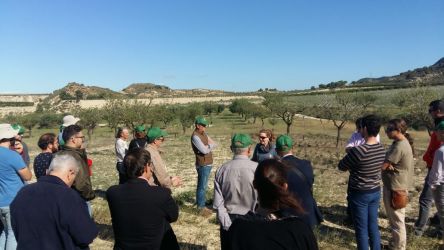Around 40 farmers learnt about the benefits of crop diversification in the first Diverfarming informative seminar held in Murcia
With the intention of creating a community, the team formed by Universidad Politécnica de Cartagena (UPCT), Asaja Región de Murcia, Disfrimur Logística, the research centre CEBAS – CSIC, and Industrias David, as partners involved in the case studies of the Diverfarming Project located in the Region of Murcia, have been responsible for putting into practice an informative day about the project, the benefits of crop diversification and low-input management practices, and a visit to the case studies located in the region.
 The informative day started in the Cervecería Casa Paqui, where researchers, technicians and representatives from farming companies and associations explained their participation in the project and the work they have carried out in these first two and a half years. In this round of presentations, those attending could learn about the project’s first results as well as the economic and environmental benefits gained from crop diversification and low-input practices.
The informative day started in the Cervecería Casa Paqui, where researchers, technicians and representatives from farming companies and associations explained their participation in the project and the work they have carried out in these first two and a half years. In this round of presentations, those attending could learn about the project’s first results as well as the economic and environmental benefits gained from crop diversification and low-input practices.
In order to check these benefits on the ground, the group made up of farmers and participants in the project made field trips to the two case studies in the area, where two typical woody crops in the region are being diversified: almond and mandarin. Whilst the diversifications planted for the mandarin consist in intercropping with multiple crops of vetch, barley or oats with beans or intercropping with rotations of different crops among the alleys of the mandarin trees, for the almond the diversification is established by intercropping with crops such as capers or thyme.
The objective of this meeting was, in addition to making the project known, to stimulate the creation of a community with the intention of creating the Diverfarming communities in which the famers put into practice the diversifications studied in their lands. To participate in these communities and to gain access to the help and advice of the project team you can register in this web: http://www.diverfarming.eu/index.php/es/inicio-be-a-diverfarmer
Diverfarming is a project financed by the Horizon 2020 Programme of the European Commission, within the challenge of “Food Security, Sustainable Agriculture and Forestry, Marine, Maritime and Inland Water Research and the Bioeconomy”, which counts on the participation of the Universities of Cartagena and Córdoba (Spain), Tuscia (Italy), Exeter and Portsmouth (United Kingdom), Wageningen (Netherlands), Trier (Germany), Pecs (Hungary) and ETH Zurich (Switzerland), the research centres Consiglio per la ricerca in agricoltura e l'analisi dell'economia agraria (Italy), the Consejo Superior de Investigaciones Científicas (Spain) and the Natural Resources Institute LUKE (Finland), the agrarian organisation ASAJA, and the companies Casalasco and Barilla (Italy), Arento, LogísticaDFM and Industrias David (Spain), Nieuw Bromo Van Tilburg and Ekoboerdeij de Lingehof (Netherlands), Weingut Dr. Frey (Germany), Nedel-Market KFT and Gere (Hungary) and Paavolan Kotijuustola and Polven Juustola (Finland).










